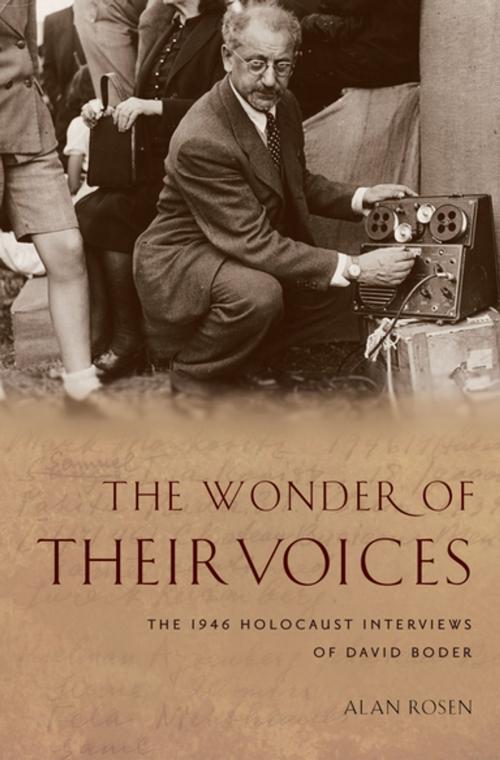The Wonder of Their Voices
The 1946 Holocaust Interviews of David Boder
Nonfiction, History, Jewish, Holocaust, European General| Author: | Alan Rosen | ISBN: | 9780199889563 |
| Publisher: | Oxford University Press | Publication: | November 4, 2010 |
| Imprint: | Oxford University Press | Language: | English |
| Author: | Alan Rosen |
| ISBN: | 9780199889563 |
| Publisher: | Oxford University Press |
| Publication: | November 4, 2010 |
| Imprint: | Oxford University Press |
| Language: | English |
Over the last several decades, video testimony with aging Holocaust survivors has brought these witnesses into the limelight. Yet the success of these projects has made it seem that little survivor testimony took place in earlier years. In truth, thousands of survivors began to recount their experience at the earliest opportunity. This book provides the first full-length case study of early postwar Holocaust testimony, focusing on David Boder's 1946 displaced persons interview project. In July 1946, Boder, a psychologist, traveled to Europe to interview victims of the Holocaust who were in the Displaced Persons (DP) camps and what he called "shelter houses." During his nine weeks in Europe, Boder carried out approximately 130 interviews in nine languages and recorded them on a wire recorder. Likely the earliest audio recorded testimony of Holocaust survivors, the interviews are valuable today for the spoken word (that of the DP narrators and of Boder himself) and also for the song sessions and religious services that Boder recorded. Eighty sessions were eventually transcribed into English, most of which were included in a self-published manuscript. Alan Rosen sets Boder's project in the context of the postwar response to displaced persons, sketches the dramatic background of his previous life and work, chronicles in detail the evolving process of interviewing both Jewish and non-Jewish DPs, and examines from several angles the implications for the history of Holocaust testimony. Such early postwar testimony, Rosen avers, deserves to be taken on its own terms rather than to be enfolded into earlier or later schemas of testimony. Moreover, Boder's efforts and the support he was given for them demonstrate that American postwar response to the Holocaust was not universally indifferent but rather often engaged, concerned, and resourceful.
Over the last several decades, video testimony with aging Holocaust survivors has brought these witnesses into the limelight. Yet the success of these projects has made it seem that little survivor testimony took place in earlier years. In truth, thousands of survivors began to recount their experience at the earliest opportunity. This book provides the first full-length case study of early postwar Holocaust testimony, focusing on David Boder's 1946 displaced persons interview project. In July 1946, Boder, a psychologist, traveled to Europe to interview victims of the Holocaust who were in the Displaced Persons (DP) camps and what he called "shelter houses." During his nine weeks in Europe, Boder carried out approximately 130 interviews in nine languages and recorded them on a wire recorder. Likely the earliest audio recorded testimony of Holocaust survivors, the interviews are valuable today for the spoken word (that of the DP narrators and of Boder himself) and also for the song sessions and religious services that Boder recorded. Eighty sessions were eventually transcribed into English, most of which were included in a self-published manuscript. Alan Rosen sets Boder's project in the context of the postwar response to displaced persons, sketches the dramatic background of his previous life and work, chronicles in detail the evolving process of interviewing both Jewish and non-Jewish DPs, and examines from several angles the implications for the history of Holocaust testimony. Such early postwar testimony, Rosen avers, deserves to be taken on its own terms rather than to be enfolded into earlier or later schemas of testimony. Moreover, Boder's efforts and the support he was given for them demonstrate that American postwar response to the Holocaust was not universally indifferent but rather often engaged, concerned, and resourceful.















